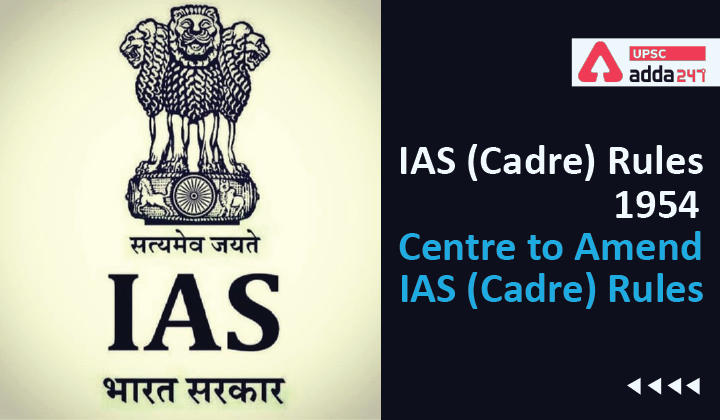Table of Contents
Centre to Amend IAS (Cadre) Rules- Relevance for UPSC Exam
- GS Paper 2: Federalism- Functions and responsibilities of the Union and the States; Issues and challenges pertaining to the federal structure.
Centre to Amend IAS (Cadre) Rules- Context
- Recently, the Union government proposed to amend Rule 6 (deputation of cadre officers) of the Indian Administrative Service (Cadre) Rules 1954 (IAS Cadre Rules 1954).
- The Department of Personnel and Training (DoPT) wrote to the States for the proposed amendments in the IAS (Cadre) Rules 1954.
- At least six State governments had written to the DoPT opposing any move to amend the IAS Cadre Rules.
IAS Roles and Responsibilities: Training, Powers, Life, Functions
Centre to Amend IAS (Cadre) Rules- Proposed Amendments
The Union Government proposes four amendments to Rule 6 of the IAS (Cadre) Rules 1954-
- First Amendment: If the State government delays posting a State cadre officer to the Centre and does not give effect to the Central government’s decision within the specified time, “the officer shall stand relieved from cadre from the date as may be specified by the Central government.”
- Presently, officers have to get a no-objection clearance from the State government for Central deputation.
- Second Amendment: The Centre will decide the actual number of officers to be deputed to the Central government in consultation with the State and the latter should make eligible the names of such officers.
- According to existing norms, States have to depute the All-India Services (AIS) officers, including the Indian Police Service (IPS) officers, to the Central government offices.
- Presently, at any point number of deputed officers cannot be more than 40% of the total cadre strength.
- Third Amendment: In case of any disagreement between the Centre and the State, the matter shall be decided by the Central government.
- The State shall give effect to the decision of the Centre “within a specified time.”
- Fourth Amendment: In a specific situation where services of cadre officers are required by the Central government in “public interest” the State shall give effect to its decisions within a specified time.
Centre to Amend IAS (Cadre) Rules- Reasons for States Opposition
- Centralization of Power: Union government is planning to acquire for itself overriding powers to transfer IAS and IPS officers through Central deputation.
- This is to be done by doing away with the requirement of taking the approval of the State governments.
- Against the spirit of cooperative federalism: The proposed amendment unilaterally mandates the State governments to make such a number of officers available for deputation as prescribed under [the] Central Deputation Reserve.
- Few states alleged that the proposed amendment was a bid to subvert the State’s authority guaranteed by the Constitution.
Centre to Amend IAS (Cadre) Rules- Union Government’s Reasoning
- Shortage of All India Services (AIS) officers in Union Ministries: Centre blamed states that-
- The States “are not sponsoring an adequate number of officers for Central deputation”, and
- The number of officers is not sufficient to meet the requirement at the Centre.
Also Read:




 TSPSC Group 1 Question Paper 2024, Downl...
TSPSC Group 1 Question Paper 2024, Downl...
 TSPSC Group 1 Answer key 2024 Out, Downl...
TSPSC Group 1 Answer key 2024 Out, Downl...
 UPSC Prelims 2024 Question Paper, Downlo...
UPSC Prelims 2024 Question Paper, Downlo...




